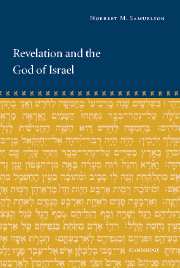Book contents
- Frontmatter
- Contents
- Acknowledgments
- Introduction
- PART I THE GOD OF REVELATION
- PART II IS THE GOD OF REVELATION BELIEVABLE?
- 5 The challenges of political ethics – issues of racism and the irrational
- 6 The challenges of modern science
- 7 The challenges of modern philosophy – rethinking God
- 8 Are the Hebrew Scriptures revealed?
- Conclusion
- Works cited
- Index of names
- Index of subjects
7 - The challenges of modern philosophy – rethinking God
Published online by Cambridge University Press: 22 September 2009
- Frontmatter
- Contents
- Acknowledgments
- Introduction
- PART I THE GOD OF REVELATION
- PART II IS THE GOD OF REVELATION BELIEVABLE?
- 5 The challenges of political ethics – issues of racism and the irrational
- 6 The challenges of modern science
- 7 The challenges of modern philosophy – rethinking God
- 8 Are the Hebrew Scriptures revealed?
- Conclusion
- Works cited
- Index of names
- Index of subjects
Summary
REVIEW
This book is a study in the philosophy of religions and its central concern is to develop an interpretation of revelation out of the sources of Jewish philosophy that is believable as a foundational principle for Judaism. To serve as a basis for Jewish belief the principle must make sense out of the claim that God gave the Torah to Moses at Sinai, and that a tradition of rabbinic interpretation of the Torah is in some sense authoritative for religious Jews in their decisions about what they ought to believe and do. All versions of Judaism agree that whatever is the sense in which this tradition has authority, it does not involve any literal reading of the Hebrew Scriptures in the simplistic way that some Christians read them. However, there is no consensus, in either rabbinic history or the present, on what these Scriptures do mean by which they can be considered authoritative. The critical divisions are between secular Jews, orthodox religious Jews, and liberal religious Jews.
SECULAR JUDAISM
For secular Jews, both the Torah and rabbinic tradition may have some authority as a personal ancestral record. These Jews have a strong sense of familial identity with the Jewish people, and, as such, they value all records of their family's past. These religious documents hold a special place of importance. However, it is not reasonable to say that they are in any viable sense authoritative for belief or practice.
- Type
- Chapter
- Information
- Revelation and the God of Israel , pp. 170 - 220Publisher: Cambridge University PressPrint publication year: 2002



